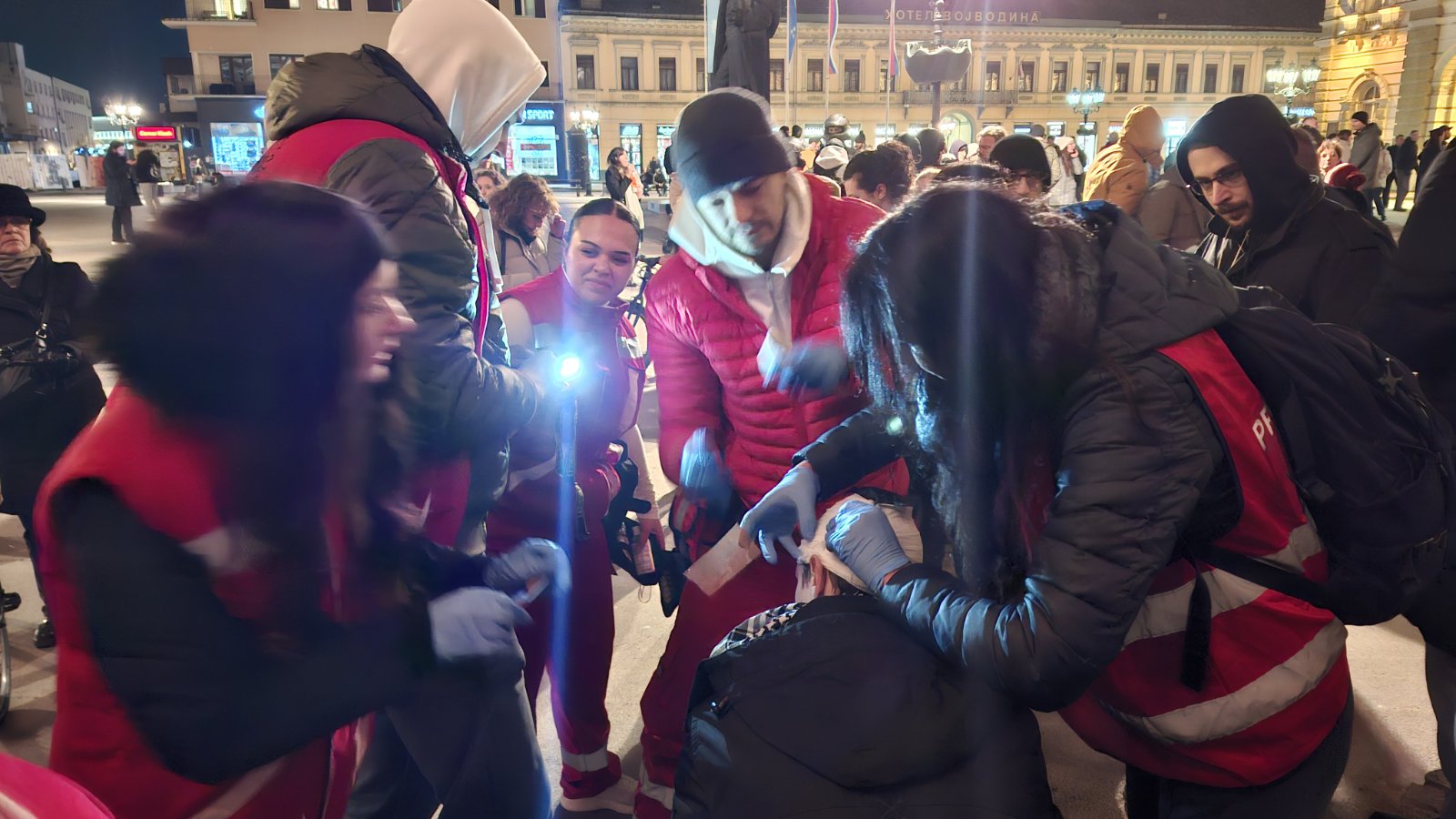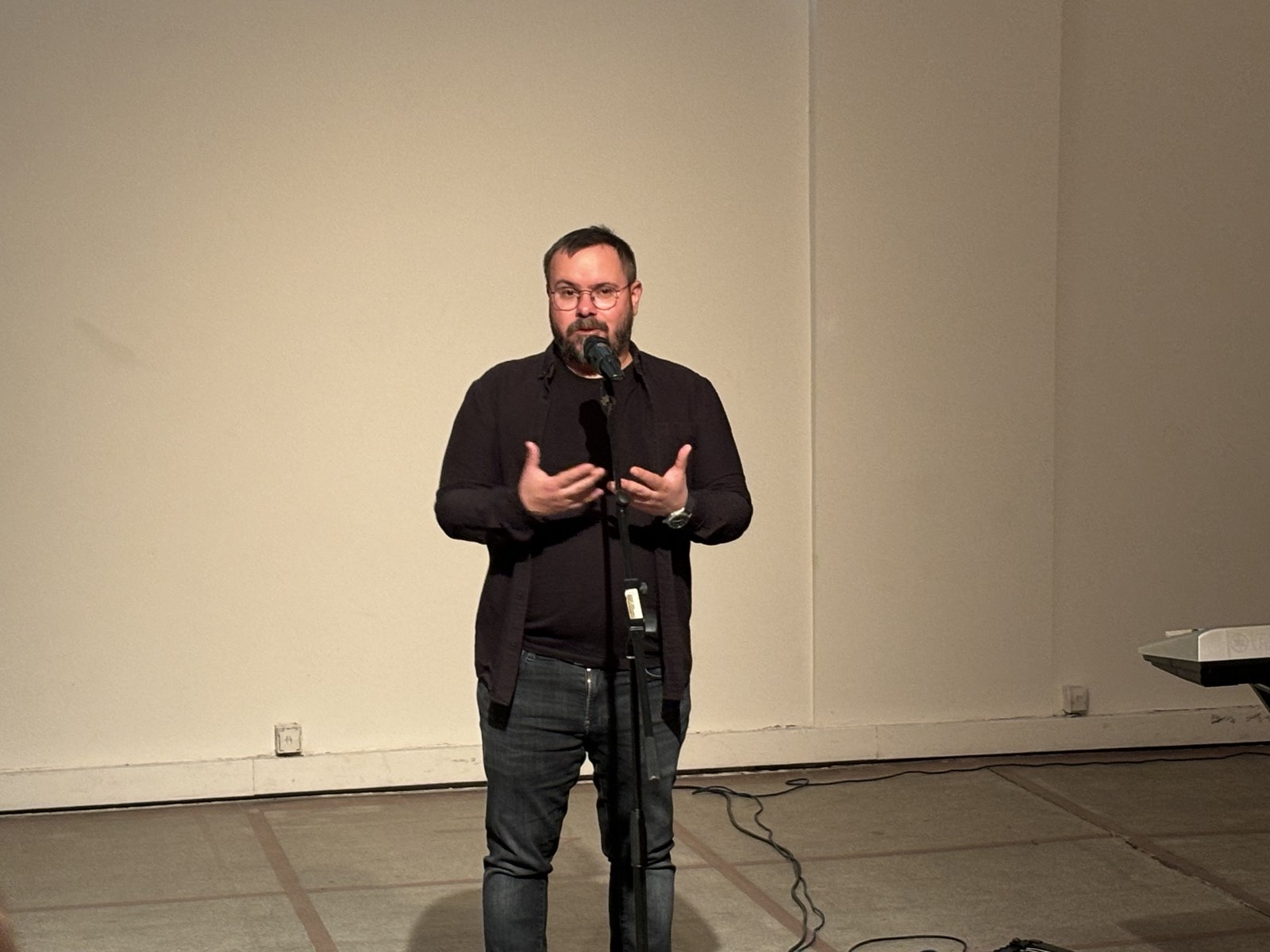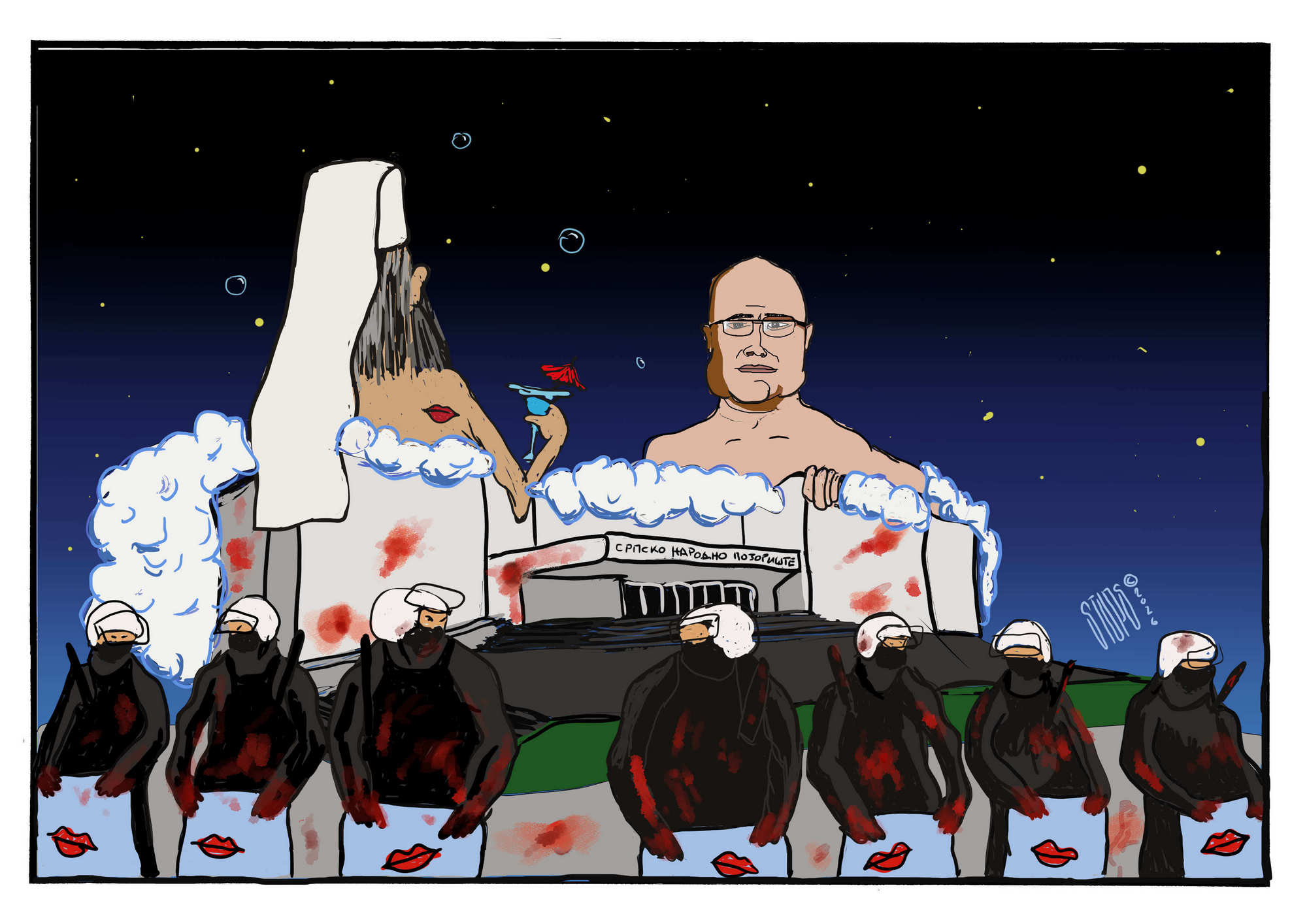
Ukraine attacks Russia!” was the surreal headline on a report in the 22 February edition of Informer, Serbia’s biggest-selling tabloid. That headline was not a one off, it was an expression of the Putinophilia that has been strong in Serbia for years. As most of the world condemned Russia’s aggression against Ukraine, much of the media in Serbia turned to glorification of Russia’s actions. Tabloids, web portals, dailies, weeklies and nationwide television channels celebrated the destruction of Ukrainian cities and gave wholehearted support to Russian armed forces. The killing of civilians, the levelling of cities and the destruction of cultural monuments appeared to fill some of Serbia’s editors with enthusiasm and exuberance.
Pro-Russia rallies took place in Belgrade, at which the crowd cheered Putin and the letter Z was scrawled on the asphalt. The rest of the world shuddered as it watched real-time coverage of corpses on the streets of Bucha, civilians sheltering from Russian shells in underground stations and millions of refugees fleeing their country, but instead of compassionfor innocent victims, understanding for the criminals seemed the response of Putin’s Serbian fans.
If President Aleksandar Vučić’s allies in the Serb media appear sanguine about death and destruction in Ukraine, he claims that the country is politically neutral. Serbia has grudgingly voted in favour of the UN general assembly’s resolutions condemning Russia’s use of forceand illegal annexation of Ukrainian territory. But the Vučić government has repeatedly refused to back western sanctions against Russia. European officials, US senators and various envoys have flocked to Vučić, telling him that it was time to choose: would Serbia be part of Europe or an ally of Russia? Despite all the pressure, Vučić keeps Serbia in limbo.
But there can be no neutrality when it comes to Russia’s campaign against Ukraine. To remain neutral while an executioner butchers a victim means morally siding with the executioner.
Serbia’s attitude towards the war in Ukraine requires additional context. Whereas in other countries, the Russian state-owned news agency, Sputnik, and the Russian TV channel RT diffuse the Kremlin’s propaganda, in Serbia most of the domestic media act as if they themselves are part of the Russian machinery under the command of the Kremlin’s communications supervisors. The problem is not limited to the media. Serbia has never renounced the Greater Serbia nationalist ideology that led to the wars of the former Yugoslavia. The one exception was the short premiership of Zoran Đinđić, but that was cut short by his assassination in 2003 .
Today’s Serb political leaders were participants in the wars of the 1990s. Vučić was a high-ranking official of the Serbian Radical party of convicted war criminal Vojislav Šešelj. His coalition partner Ivica Dačić, leader of the Socialist party of Serbia, was Slobodan Milošević’s spokesman. One of Vučić’s closest associates, the minister of the interior, Aleksandar Vulin, began his career as a functionary of the Yugoslav Left, the party founded by Milošević’s late wife, Mirjana Marković. Today’s minister for European integration, Jadranka Joksimović, worked on the Serbian Radical party’s magazine, Velika Srbija, whose title (Greater Serbia) speaks for itself.
Serbian political leaders still don’t publicly acknowledge Srebrenica as genocide. If at all, they refer to the “terrible crimes” committed. But there has been no dealing with the past at the state level. On the contrary, political, media, cultural, church and social elites continue to deny Serbian responsibility for war crimes. Serbia’s recent historical revisionism suggests that it was Serbs who were the victims , never the criminals. Internationally convicted Serb war criminals return home after serving their sentences and given heroes’ welcomes, sinecures and media space to expound their version of the truth, which The Hague tribunal was of course, unable to understand.
For far-right Serb nationalists, the current state of peace in the Balkans is temporary, just like the borders. They still dream of a great Serbian state that will encompass Kosovo, Montenegro, Republika Srpska and parts of Croatia. The realisation of that dream is not possible as things stand, but the nationalists are patient. After defeat in the Yugoslav wars, they retreated to lick their wounds, fuel hatred towards their neighbours and keep the population in a state of combat-readiness via the media. That they must bide their time until international circumstances change has been one of the main narratives of Russian propaganda for the Serbian market filtered through parts of the Serb media for more than two decades.
Serb ultra-nationalists have waited for Russia to enter into a decisive conflict with the western antichrist, to defeat godless Europe and the US and to establish a different world order. They have placed their faith in Putin as a messiah and imagine him as an upgraded version of Slobodan Milošević: the ruler of a powerful empire with a nuclear arsenal at his disposal.
When Russia invaded Ukraine, Putin’s followers here thought their hour had come; this was the beginning of the great upheaval in which the old order would be razed and from its ruins a world would arise where sovereignty, borders and international treaties were of no import. Instead of international law and other western trifles, the law of the jungle would prevail, as authoritarian tradition dictates. States such as Serbia, favoured by the world’s ruler enthroned in the Kremlin would gain the right to finish what they started three decades ago to finally create the enlarged state for which they have been longing for centuries, to fit their own imagined grandeur.
Lauding Russia’s criminal aggression against a sovereign country may seem strange to the uninformed. But for those of us who live in the heart of darkness, a country whose heroes are Slobodan Milošević, Radovan Karadžić and Ratko Mladić, we expect nothing better. Those who still believe conspiracy theories about the 1994 massacre in Sarajevo’s Markale that it was staged and the dismembered corpses were actually dummies, will easily believe similar propaganda about the massacres of civilians in Bucha. If media hyenas can deride the victims of the Srebrenica genocide on primetime TV, why would they grieve for the victims of Putin’s crimes? As the great Serbian writer and thinker Radomir Konstantinović said in 1991: “We live in a world (if this is living) in which the monstrous is coming to be natural, and the natural monstrous.” His diagnosis of Serbia has, unfortunately, lost none of its accuracy.









 STUPS: Paralelni univerzumi
STUPS: Paralelni univerzumi